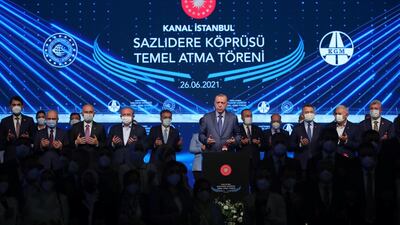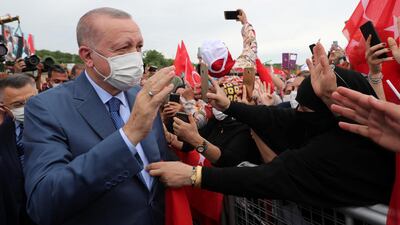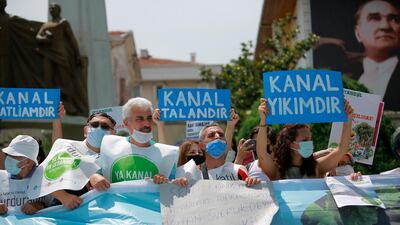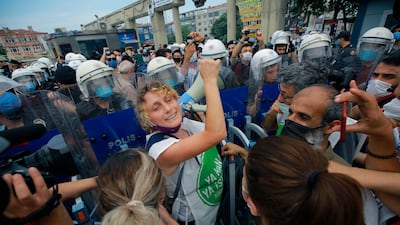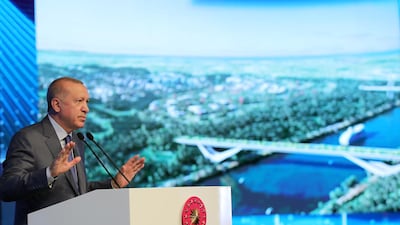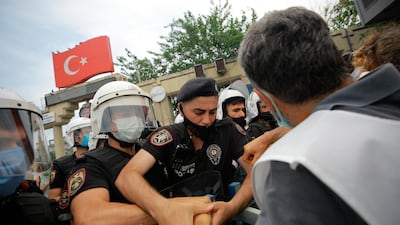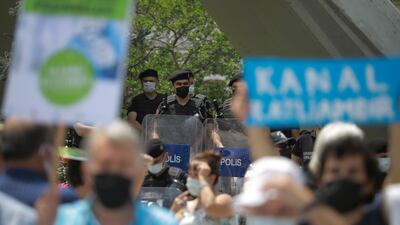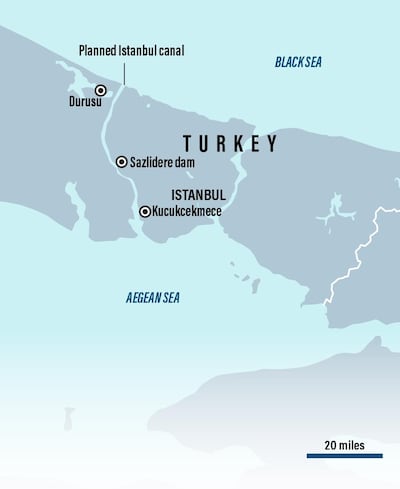Turkey’s President Recep Tayyip Erdogan on Saturday poured the first load of cement in the building of what he has called his “crazy project” – a ship canal that runs around Istanbul, bypassing the Bosphorus Strait.
The ground-breaking ceremony at Sazlidere dam, west of the city, marked the start of a scheme that has been 10 years in the making and caused more controversy than any other undertaken during Mr Erdogan's 18-year rule.
But there are questions over whether the project, which envisages a 45-kilometre waterway linking the Sea of Marmara to the Black Sea, will be completed in the six-year time frame.
Among those leading objections to the canal are the mayor of Istanbul and the leader of the opposition party he represents.
Kemal Kilicdaroglu, who leads the Republican People's Party (CHP), has vowed to abandon the $15 billion plan if Mr Erdogan is defeated in elections due to be held in 2023.
Both he and Istanbul Mayor Ekrem Imamoglu, who is regarded as a potential presidential candidate, have also threatened to blacklist international finance and construction firms involved in the project.
“I suggest that any [person who] intends to do this job, who says ‘I will pay for this project, I will put this country in debt’, should sit down and think again a thousand times, because in two years’ time no one will deal with them on behalf of the country,” Mr Imamoglu said last weekend.
The mayor has already fired the first shot in what promises to be a protracted war between Mr Erdogan and the canal’s opponents by removing construction workers’ accommodation from land owned by the Istanbul water authority.
Turkish banks signed up to the UN’ green principles are reportedly reluctant to invest in the project, given the possibility of cancellation and environmental concerns.
The canal will cut through farms, marshes and about two dozen villages, destroying marine ecosystems as well as basins that provide nearly a third of Istanbul's fresh water.
Environmentalists have raised the alarm over the effect on the Sea of Marmara – already struggling with widespread mucilage, or “sea snot”, owing to rising water temperatures and pollution.
The nearby 8,500-year-old Yarimburgaz archaeological site is also under threat
Turkey's government has said tenders will be open to foreign investors but many say the scheme is a white elephant that will benefit only real estate speculators and builders.
The bridge Mr Erdogan inaugurated on Saturday is the first of six that will cross the canal in a project that will create a new urban centre of up to 1.2 million people.
This 860-metre, eight-lane bridge will connect to a highway linking Istanbul’s new airport and a third Bosphorus bridge – other developments in an infrastructure splurge under Mr Erdogan that have cost tens of billions of dollars.
"Today we are turning a new page in the history of Turkey's development," the president said on Saturday.
“We see Canal Istanbul as a project to save the future of Istanbul.”
Mr Erdogan highlighted the risk of shipping accidents in the Bosphorus before pressing a button to release the first batch of cement for the bridge's foundation as confetti and fireworks were set off.
Mr Imamoglu called the ceremony an "illusion" and said the bridge was planned years earlier as part of the North Marmara highway that also links the airport and the third Bosphorus bridge.
“Even if there was no such thing as Canal Istanbul on Turkey’s agenda today, this bridge would be built. That's the illusion,” he said on Thursday.
“In other words, the construction of a bridge here has nothing to do with the canal project. It’s something to do with the road hub.”
Many others have questioned the feasibility of the canal and raised suspicions that its main purpose is to profit pro-government firms that will build luxury homes, shopping centres and a marina alongside the waterway.
“Considering Istanbul Airport and the new regions opening to settlement, it is possible to say that the Canal Istanbul proposal is an integrated rent project,” said Ugur Emek, an economics professor at Baskent University in Ankara.
Nuran Zeren Gulersoy, head of architecture at Istanbul's Isik University, said the project would harm "the quality of life" of Istanbul residents.
"In summary, this is not a transport project but a residential project that a canal passes through."
Kemal Doksanyedi, from Either the Canal or Istanbul, a coalition of NGOs, described the canal as a political project.
“The government needs a project, a vision, ahead of a possible early election,” he said.
Mr Doksanyedi said the president was trying to polarise opinion by pitting Istanbul's municipality against the central government led by My Erdogan's Justice and Development Party, or AKP.
“The AKP government has always made all kinds of election propaganda against the opposition and has succeeded through dissent.”
Cemal Saydam, professor of environmental engineering at Ankara's Hacettepe University, highlighted the risk of embarking on such an irreversible mega-project.
“Canal Istanbul is not a project that you can say ‘We made a mistake, let’s go back.’ Even if you regret it, there is never any going back,” he said.
“Therefore, this project should not happen.”
